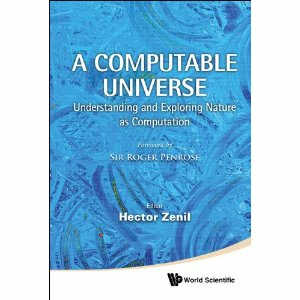| A Computable Universe - Roger Penrose On Nature As Computation |
| Written by Mike James |
| Sunday, 03 June 2012 |
|
A Computable Universe is a collection of papers on the nature of computation and computation in nature. Is it time that computation took its place as the theory of everything? Update: The introduction to the book is now available as a free pdf download - see More Information.
Following on from the recent ten-year anniversary of the publication of Stephen Wolfram's A New Kind of Science, we have an other "big book" on how computation might fit in with the other sciences: A Computable Universe. And notice there is no question mark at the end of the title. The publication of a collection of papers on the nature of computation and computation in nature is part of the Turing Year celebrations. Edited by Hector Zenil and published by World Science, A Computable Universe is dedicated to the memory of Alan M Turing on the 100th anniversary of his birth. The foreword by Roger Penrose is available as a pdf for you to read. Is it time that computation took its place as the theory of everything? The papers, many of which are available online, discuss the foundations of computation in relation to nature. They take information and computation to be key to understanding and explaining the basic structure underpinning physical reality and focus on two main questions: What is computation? How does nature compute?
(Click on cover for table of contents) The articles range from the historical perspective of Dorian Swade's "Origins of Digital Computing" and overviews of computation through computation in biology e.g. "Bacteria, Turing machines and Hyperbolic Cellular Automata", on to physics e.g. "The Computable Universe Hypothesis" and so on. There is also a section on quantum computation which is perhaps the most speculative of all. Notable in this section is "What is Computation and (How) Does Nature Compute" which comes from a round table discussion and "The Universe as Quantum Computer" by Seth Lloyd. It also includes a new edition of Konrad Zuse's "Calculating Space". Like any multidisciplinary volume, the range is from the almost crackpot to the completely opaque. Reading it should be an adventure. Roger Penrose's preface is worth recommending even to the general reader. It starts by going over the movement of physics as a predictive computation device from Newton to Einstein and quantum mechanics, a move apparently taking us from the continuum to the discrete. Then we have a summary of computational theory itself in the form of the Turing-Church thesis. Soon though, quantum mechanics raises its head and we confront the problem of measurement. Penrose then argues that a possible solution is that gravity is responsible for state collapse. The connection with computation is that this theory would have to be non-computable in some way to allow for non-locality. The reason put forward is the Godel incompleteness theory which is taken to mean that human thought must in some sense embody some sort of non-computability principle. In short, Godel's theorems imply that human thought is not the result of a computational process. From here we have a recap of the idea that human thought escapes computation by being quantum mechanical. If you are a computer scientist or a physicist then there is much here that you are simply not going to agree with. However, it is well argued and you could spend some time trying to see the flaws in the reasoning, if any.
It seems obvious that computation is just the continuation of theorizing by other means. The problem is that the connection between the digital and the seemingly unavoidable discretization at the Planck length and time just don't seem to want to fit together. Some new ideas are needed and in the meantime we just wait for a new Turing-like polymath who can see the connections. To pre-order a copy of A Computable Universe click on the Amazon link in the sidebar. More InformationIntroducing the Computable Universe Further ReadingTo be informed about new articles on I Programmer, install the I Programmer Toolbar, subscribe to the RSS feed, follow us on, Twitter, Facebook, Google+ or Linkedin, or sign up for our weekly newsletter.
Comments
or email your comment to: comments@i-programmer.info
|
| Last Updated ( Wednesday, 04 July 2012 ) |



